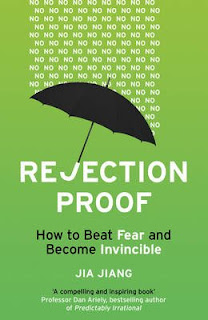Rejection, Inbound Marketing, Geofencing and Why There Almost Certainly Is a God – What I learnt This Month.
I have decided to start a new section for my blog – What I
have learnt this month. It is a great place for me to reflect upon the things
that I have learnt but I hope that it will also be useful to you in finding
interesting resources to help you grow.
I will be covering pretty much anything I use to learn such
as books, podcasts, videos, articles and courses.
So what have I learnt in the month of November 2017?
So what have I learnt in the month of November 2017?
Rejection Proof – Book I Read This Month
Most of us have an inbuilt fear of rejection.
It stops us fulfilling our dreams.
It inhibits our ability to act.
It thwarts our goals and desires and paralyses us.
We worry about humiliation and how the rejection will affect
our confidence.
This was also the case for Jia Jiang (who wrote this book).
He desired to be an entrepreneur, but due to fear of rejection he never made
the leap and continued working for someone else.
After researching fear of rejection he came across
“rejection therapy” and decided to embark on his own version of this therapy:
“100 days of rejection”.
Starting a video blog to document the journey, he chose a
different rejection challenge each day.
These ranged from such requests as asking
a security guard for $100, asking a stranger if he could play soccer in his
garden, asking a pilot if he could fly his plane, to asking a flight attendant
if he could read the safety announcements.
When he started this journey it was to overcome rejection,
but what he found was that the more he asked, and got better at asking, the
more people began to say yes!
In the end he not only got over his fear of rejection, but
also learnt lots of skills to get better at asking, and also, get better at
rejecting others (in a nice, kind way).
I highly recommend this book and hope to do my own version
of the rejection challenge in 2018!
Inbound Marketing – Course I Took This Month (& It’s implications for
the Church)
I recently switched roles from learning and development to
marketing. To get into the swing of things I decided to take a few courses on
marketing.
Before switching roles I had never heard of inbound
marketing, but after taking the course it has totally changed my perception of
marketing.
Inbound marketing is contrasted to the more traditional ‘outbound
marketing’.
Outbound marketing is defined by cold calls, cold emails,
and advertisements that interrupt us.
Conversely, inbound marketing is about drawing people into
what your brand is doing by creating things of actual value.
The primary essence of inbound marketing is about
identifying your primary customers (buyer personas), then identifying their
pain points – the things that they are struggling with.
Once the pain points have been identified you then create
things that address the pain points and help the person and distribute these
for free. These can be articles, eBooks, webinars, seminars, podcast, videos,
or anything else that could be useful to your customer.
Your product is also included as something that addresses the pain point (but is not free). The inbound marketing helps people who will actually be helped by your product to find it (rather than pushing it to a load of people who don't actually want or need your product).
I believe that this has implications for the Church.
I read recently that the largest boycott in history is
taking place write now. It’s people installing ad-blockers on their phones and computers. Millions of them (over 198 Million!).
People are sick of adverts, they are sick of people trying
to push stuff on them. And it is the same with the Church.
If we change the scope slightly, then running toddler
groups, food banks, debt counselling sessions, marriage counselling etc. all
these things are essentially inbound marketing.
We are creating useful
resources that address the pain points of the people that we are here to reach.
And this is what we must continue to do.
How Tech Will Transform Event Management [Infographic] – Article I Read
This Month (& It’s implications for the Church)
This was a fascinating article, talking about stuff I had
never heard of, however I knew that it had potential implications for the
Church.
Although the Church can never be reduced to an event, a
church service as a gathering of believers is essentially an event. Therefore
some of the emerging technologies must have implications for the Church.
The tech the article talks about are:
- Geofencing
- API (Application Programme Interface)
- Email & Marketing Automation
- Social Media
- Live Streaming
- RFID
- Wearables
- Virtual Reality
- Robots & Drones
- Crowdshaping
Some of these are already starting to be implemented in
church (Email & marketing automation, social media, live streaming), some I
am a bit dubious about (robots & drones), and some I think may be a bit to
early for any serious adoption (virtual reality – although it would be super
fun to see VR versions of the places spoken about in the Bible stories like the
Temple, or lake Galilee during a service!). However some I thought might be
very interesting.
The primary one I thought looked interesting was geofencing.
Geofencing (as well as beacons – not spoken about in this
article) involve mapping off (using coordinates) a geographical area. When
people enter the area in question, you can send them push notifications or
other pieces of information. This could be upcoming news, the bible readings
for the day, helpful resources or anything else you can think of.
The Christian Idea Of God – Podcast I Listened To This Month
I absolutely loved this podcast from Home Brewed Christianity. It is an interview with Keith Ward, a philosopher &
theologian who has authored loads of book (seriously. Loads!).
The whole interview was fascinating. The best part for me
was the discussion regarding a potential movement from materialism to idealism.
Materialism being the belief that the material world represents
the ultimate reality.
Idealism being the belief that consciousness represents the
ultimate reality.
Keith makes the case that many physicists are so deeply
perplexed by discoveries in physics (such as quantum physics & dark matter)
that they are realising that we just don’t know much about the material world
at all (seriously – 96% of the universe is made up of dark energy and dark matter – and we don’t even know what it is!)
This is my first foray into the work of Keith Ward but I
plan to get one of his books and read it as soon as possible. I thought I would
start with “Why There Almost Certainly Is a God”* as a good starting point – so
expect to see that soon in the ‘book I read this month’ part 😊










Comments
Post a Comment